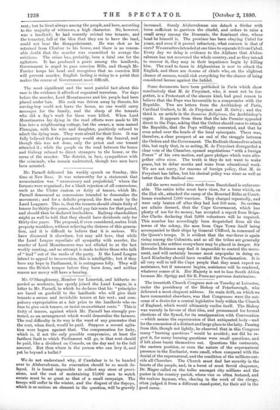The twentieth Church Congress met on Tuesday at Leicester, under
the presidency of the Bishop of Peterborough, who delivered a most eloquent address. Its main drift, on which we have commented elsewhere, was that Congresses were the out- come of a desire for a central legislative body within the Church of England, which would ultimately realise itself. The Bishop was warmly in favour of that idea, and pronounced for formal elections of the Synod, for its amalgamation with Convocation —which means the supersession of that antiquated body—and for the concession of a distinct and large place to the laity. Passing from this, though not lightly, he observed that in this Congress many "burning questions" would be avoided ; nor did he re- gret it, for many burning questions were small questions, and if left alone burnt themselves out. Questions like vestments, the eastern position, or even the nature of the supernatural presence in the Eucharist, were small, when compared with the denial of the supernatural, and the condition of the millions.out- side all Churches. The Church must End her security in the hearts of the people, and, in a burst of most fervid eloquence, Dr. Magee called on the toiler amongst city millions and the pastor in the conntiy parish, where vice so often festered, and the zealous layman, who, sharing in the work of the clergy, often judged it from a different stand-point, for their aid in the good cause.


































 Previous page
Previous page